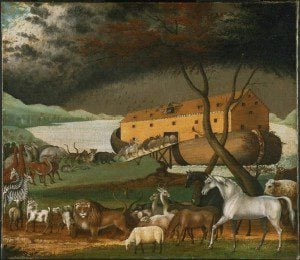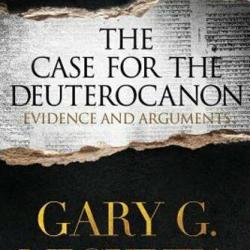Noah’s Ark (1846), a painting by the American folk painter Edward Hicks [public domain / Wikimedia Commons]
***
I received the following question on my Facebook Author page:
I am not convinced that the belief in a world-wide deluge is supported by any kind of balanced, rational evaluation of the material evidence. How do you, as an apologist, reconcile the Biblical account of the Deluge with the many empirical evidences which support conventional geology, and oppose the possibility of a cataclysmic, worldwide flood?
You assume that I have to “reconcile” all this stuff. I need not do any such thing. The biblical text doesn’t require that; nor does the Church. The Church doesn’t require belief in flood geology or catastrophism, and it doesn’t require an absolute rejection of evolutionary theory (only the strictly materialistic version of it; and it requires belief in Adam and Eve as the primal human pair who fell, etc.). Nor does it require a young earth.
Lastly, the Bible doesn’t require the Flood (an actual historical event, as indicated several times in the NT) to have been literally global, as we see in the treatment of the Flood in The Catholic Encyclopedia of 1913.
The Flood was historical. Neither the Bible nor the Catholic Church require one to believe that it was literally global in nature, and legitimate science would indicate that it was not as well. The New Testament (including Jesus) casually assumes that Noah and the Flood were historical:
Matthew 24:37-19 (RSV) As were the days of Noah, so will be the coming of the Son of man. [38] For as in those days before the flood they were eating and drinking, marrying and giving in marriage, until the day when Noah entered the ark, [39] and they did not know until the flood came and swept them all away, so will be the coming of the Son of man. (cf. Lk 17:26-27)
Hebrews 11:7 By faith Noah, being warned by God concerning events as yet unseen, took heed and constructed an ark for the saving of his household; by this he condemned the world and became an heir of the righteousness which comes by faith. [Abraham is mentioned in the next verse]
1 Peter 3:18-21 For Christ also died for sins once for all, the righteous for the unrighteous, that he might bring us to God, being put to death in the flesh but made alive in the spirit; [19] in which he went and preached to the spirits in prison, [20] who formerly did not obey, when God’s patience waited in the days of Noah, during the building of the ark, in which a few, that is, eight persons, were saved through water. [21] Baptism, which corresponds to this, now saves you, not as a removal of dirt from the body but as an appeal to God for a clear conscience, through the resurrection of Jesus Christ,
2 Peter 2:4-9 For if God did not spare the angels when they sinned, but cast them into hell and committed them to pits of nether gloom to be kept until the judgment; [5] if he did not spare the ancient world, but preserved Noah, a herald of righteousness, with seven other persons, when he brought a flood upon the world of the ungodly; [6] if by turning the cities of Sodom and Gomor’rah to ashes he condemned them to extinction and made them an example to those who were to be ungodly; [7] and if he rescued righteous Lot, greatly distressed by the licentiousness of the wicked [8] (for by what that righteous man saw and heard as he lived among them, he was vexed in his righteous soul day after day with their lawless deeds), [9] then the Lord knows how to rescue the godly from trial, and to keep the unrighteous under punishment until the day of judgment,
The text in the Second Epistle of Peter passage moves from the fallen angels to Noah, and then to Lot (2:7), who lived in the time of Abraham, and was his nephew, to the time he was writing. St. Peter is arguing by analogy: “God rescued Noah and Lot; He can do the same for you today.” This makes absolutely no sense if the earlier people are imaginary, because you would have the real fallen angels (demons), then the imaginary Noah, then back to reality with Lot and the early Christians. This utterly violates the tenor and nature of the passage.
Some people get hung up on the word “all” as pertaining to the Flood; e.g., Genesis 6:17: “For behold, I will bring a flood of waters upon the earth, to destroy all flesh in which is the breath of life from under heaven; everything that is on the earth shall die.”
One must understand the biblical (Hebraic / ancient Near Eastern or Mesopotamian) use of language: often not intended to be absolutely literal. For example, by the following passages — referring to saving “all men” or “the world” — one might conclude (falsely; and many do) that the Bible teaches universalism. But it does not. Other passages speak of hell and those who are damned and end up there for eternity:
John 12:32 and I, when I am lifted up from the earth, will draw all men to myself. (cf. Lk 3:6; Jn 3:17; 4:42; 6:33; 12:47; 1 Jn 4:14)
Romans 5:18 Then as one man’s trespass led to condemnation for all men, so one man’s act of righteousness leads to acquittal and life for all men. (cf. 2 Cor 5:19)
Ephesians 1:9-10 For he has made known to us in all wisdom and insight the mystery of his will, according to his purpose which he set forth in Christ [10] as a plan for the fulness of time, to unite all things in him, things in heaven and things on earth.
1 Timothy 4:10 For to this end we toil and strive, because we have our hope set on the living God, who is the Savior of all men, especially of those who believe.
Titus 2:11 For the grace of God has appeared for the salvation of all men,
2 Peter 3:9 The Lord is not slow about his promise as some count slowness, but is forbearing toward you, not wishing that any should perish, but that all should reach repentance.
1 Timothy 4:10 perfectly illustrates the complexity of biblical language and thought. God is the “Savior of all men” (i.e., He is potentially so; desires that all men should be saved [1 Tim 2:4; 2 Pet 3:9]; made it possible for all men; what is called in theology, “universal atonement”). Then St. Paul the same passage states, “especially of those who believe” (i.e., the ones who are actually saved in the end and go to heaven, are those who appropriate or accept God’s grace for salvation, which they can reject in their free will, should they choose to do so).
It’s always supremely important to compare Bible passage with other related ones and to understand biblical language and styles and idioms, in context, and in accordance with the culture of the time.
This is why truly grasping the Bible in all its magnificent aspects and endless spiritual treasure, takes considerable time and study. Many refuse to do that, and so (if of a skeptical / hyper-rationalist bent) they approach God’s inspired Word as a butcher approaches a hog, and invariably arrive at erroneous interpretations. I’ve met dozens of atheists who think they are experts on the Bible. Trust me, they’re almost invariably not, and I have plainly proven that in many dialogues: exposing very basic or inexcusable mistakes and flat-out whoppers. Or (if more innocent and open-minded) folks come to wrong conclusions out of ignorance.
Related Reading:
Old Earth, Flood Geology, Local Flood, & Uniformitarianism (vs. Kevin Rice) [5-25-04; many defunct links removed and new ones added: 5-10-17]
Adam & Eve, Cain, Abel, & Noah: Historical Figures [2-20-08]
Do Carnivores on the Ark Disprove Christianity? [9-10-15]
New Testament Evidence for Noah’s Existence [National Catholic Register, 3-11-18]
Modernism vs. History in Genesis & Biblical Inspiration [7-23-18]
***
***


















